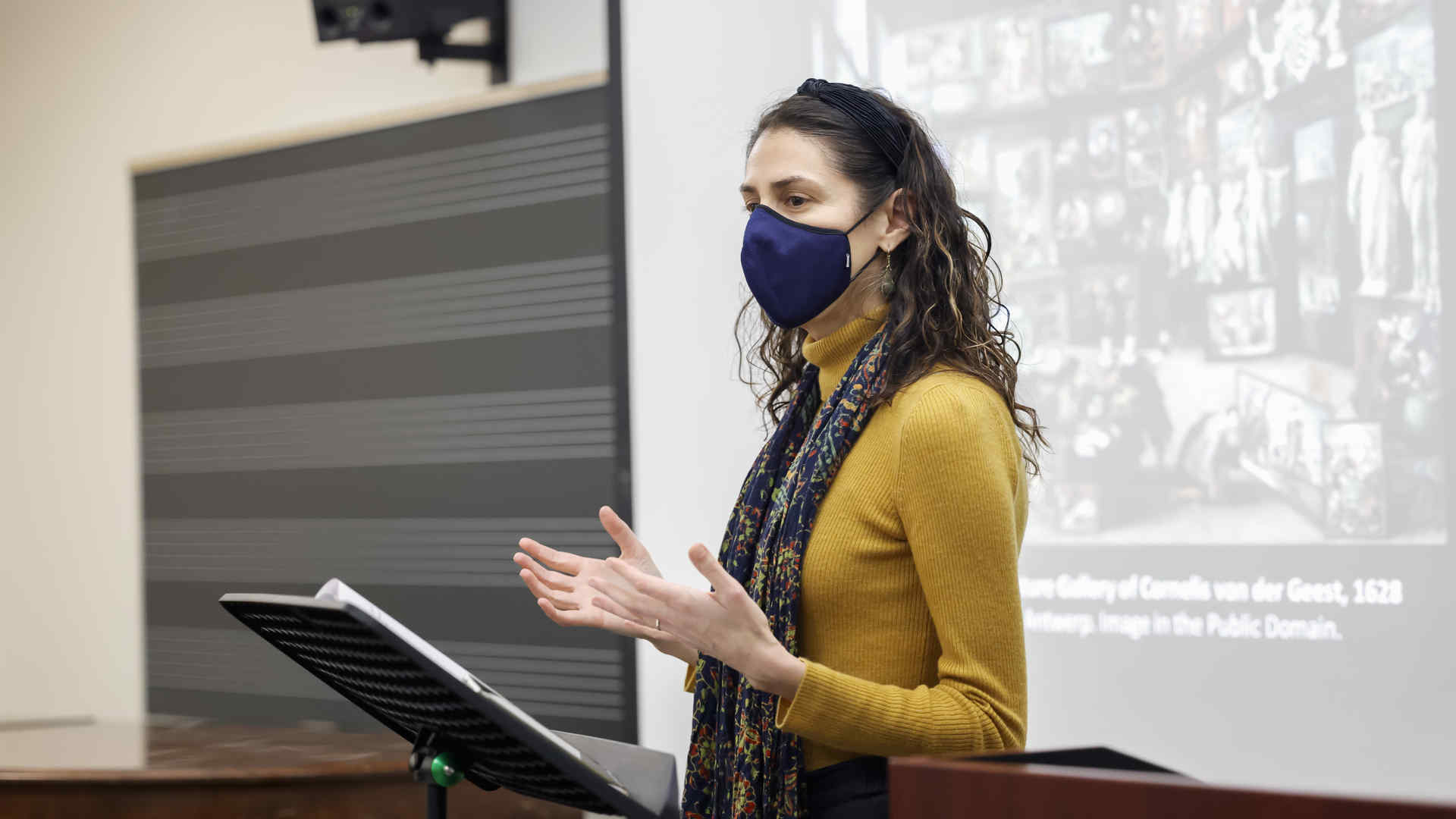
Finding Words for Complex Thoughts
By Max Tan
Music historian Elizabeth Weinfield has taught courses ranging from required undergraduate history surveys to graduate-level electives in musicology since she began teaching at Juilliard in 2019. This spring, she’s teaching From Antiquity to 1700 as well as two electives: Women Composers Before 1800 and Music, Performing, and the Public.
After receiving her bachelor’s in art history from Rutgers and a master’s in music from Oxford, Weinfield earned a PhD in historical musicology from the CUNY Graduate Center. She has also taught at City College, Fordham, and Yeshiva. Her research explores the relationship between gender, performance, and race in the early modern period, and her interests include music by women in the crypto-Jewish communities of Antwerp, performance practice, and the early music revival in America.
In a cozy fifth-floor space shared with faculty members Fredara Hadley and Anne-Marie Reynolds, Elizabeth Weinfield hosts advisement meetings and weekly office hours. Above her desk, updated musicological journals and a neat stack of resources for her classes are accompanied by a postcard with the adorable scrawl by her young son. A concert poster of Sonnambula—the historically informed ensemble she founded—adorns the desk. The ensemble features the viol, which Weinfield plays, and is celebrating its 10th season. It released its first CD in 2019, featuring the complete works of Flemish Jewish composer Leonora Duarte (1610–78); she is also working on a book about Duarte that investigates music’s role in the convergence of business and culture.
The intersection of performance practice and music history is a recurring theme in Weinfield’s courses. She has a long history at the Metropolitan Museum of Art, beginning as an intern, later in the European Paintings department performing provenance research, and ultimately as editor of the encyclopedic Heilbrunn Timeline of Art History. In 2018, Sonnambula had a residency at the Cloisters, which she said was the “perfect culmination of the history I had built at the institution.”
These days, Weinfield’s background as performer and researcher generates new course ideas for musicians at Juilliard. In the fall, she introduced The Stories of Music History, a historical survey of musicology emphasizing relevant current topics and trends, among them the origins of musicology and concepts of the musical canon, music and gender, and race in music history.
Among the students piloting the first edition of The Stories of Music History was first-year doctoral soprano Marisa Karchin, who, like many of her classmates, had little experience studying musicology. But the topics “interacted with modern mainstream ideas relevant to all musicians, leading to many talks that often took unexpected turns,” Karchin said. “We regularly lingered after class and walked out together continuing the discussion.”
Angela Wee (BM ’19, MM ’21, violin), who took one of Weinfield’s classes last year, continues to be inspired by her to relate music history to performance practice. She appreciated Weinfield’s “enthusiastic encouragement and attentive care toward each individual student,” saying, “she listens with sincere curiosity and empathy to further drive students along with their education.”
Weinfield is driven to combine her research interests with what she believes students need and finds that performance-based research is a “vital and living critical approach to take with performers.” In her early-modern seminars, she has been excited to bring together historical performance students with other music students who may not realize what or how much they share as artists. As she develops curricula for future classes, Weinfield asks: “how can we enrich our understanding of the music we value through a study of music’s material culture, in other words, the objects that interact with music history?”
Throughout the many months of navigating the school’s health guidance, Weinfield’s kind and discerning aura has continued to spill from her office into the virtual and in-person classrooms and beyond. She even found a silver lining in the Zooms during “those otherwise isolating days, connecting despite the separation of oceans and time zones.”
At the end of Weinfield’s classes, which are now happily back in person, hints of a large smile can be found hugging the edges of her mask. Teaching, she says, is personal. “I want my students to work hard and read a lot because they are worth it. Language—finding words for complex thoughts—is the best gift I can give them.”
Doctoral student Max Tan (Pre-College ’03, piano; Pre-College ’11, violin; MM ’17, Artist Diploma ’19, violin), is researching Eugène Ysaÿe’s unpublished violin, piano, and organ arrangement of Ernest Chausson’s Poème